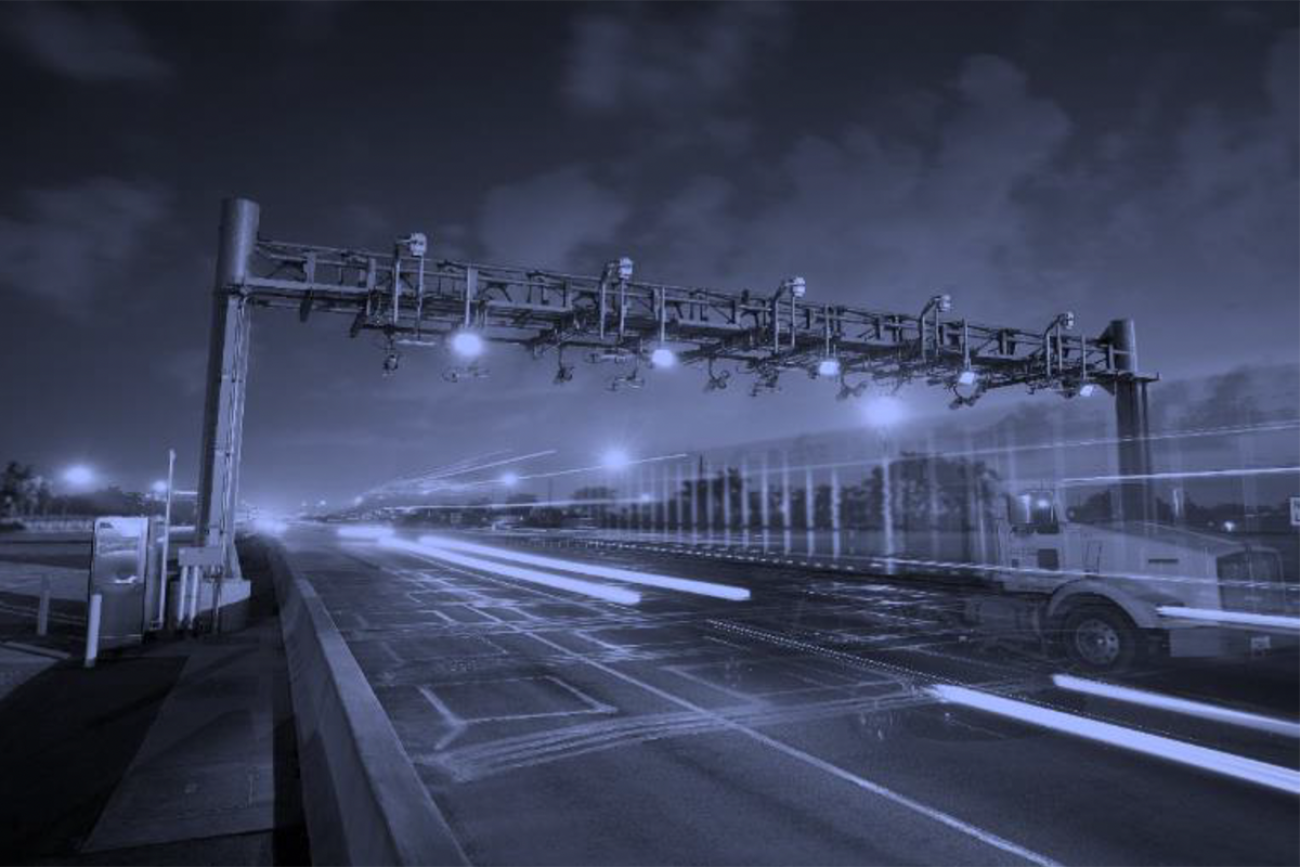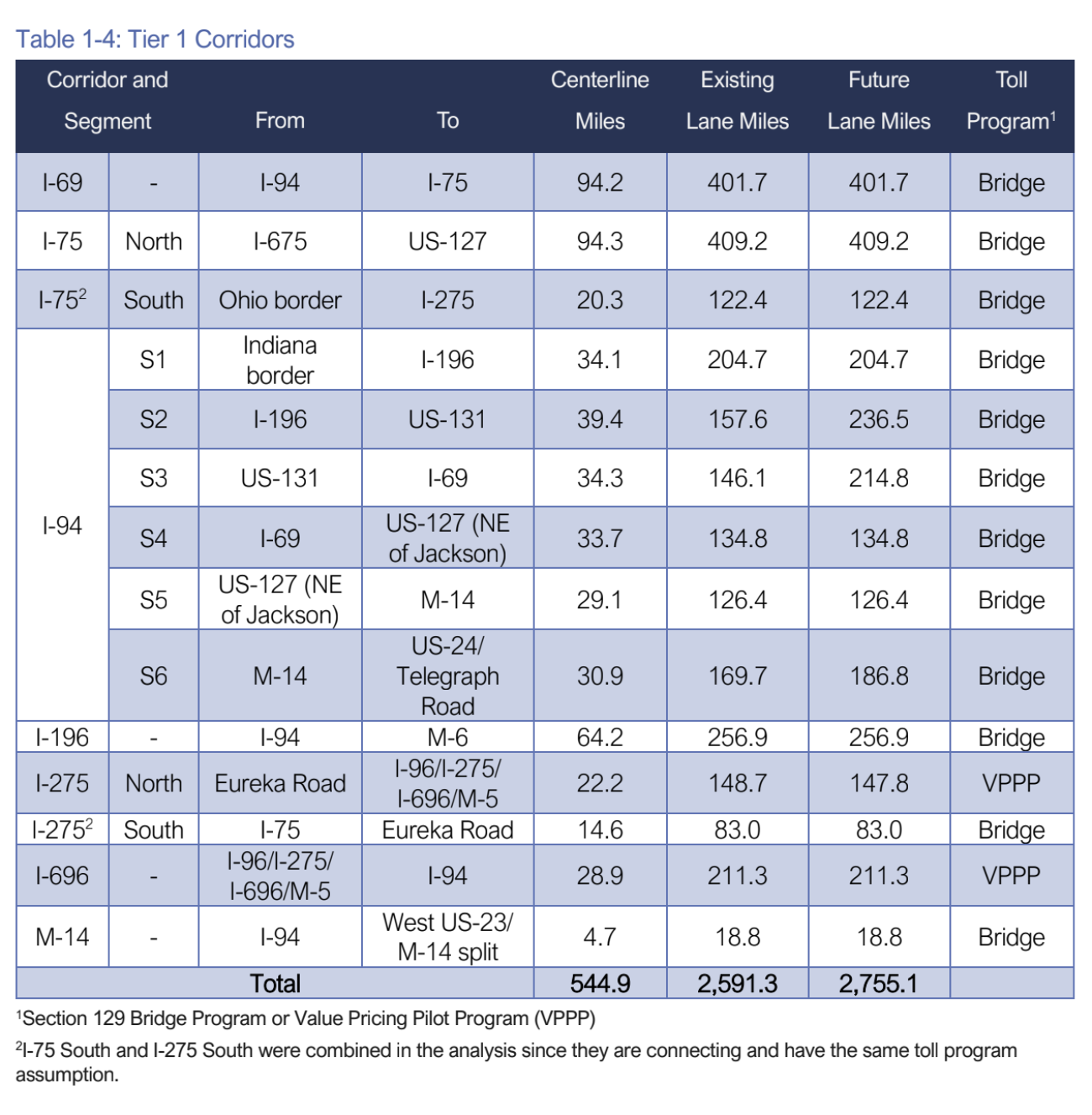Highway tolls could raise $1B to fix Michigan roads, study finds. Is it time?

- Study to lawmakers finds highway tolls ‘feasible’ in Michigan
- Experts say 6 cents per mile tolls could raise $1 billion, offset fuel tax losses, slow road deterioration
- Gov. Whitmer, Legislature exploring road funding ideas. Some say tolls an option
Jan. 24: Gov. Gretchen Whitmer open to charging tolls on Michigan roads
LANSING — Michigan could generate $1 billion a year to fix deteriorating roads by charging motorists tolls to use nearly 1,200 miles of state highways, according to new feasibility and implementation studies for the state.
Converting the highways to toll roads no doubt would be controversial, and doing so could require an “innovative approach” because of federal rules, industry consultants wrote in a series of reports reviewed by Bridge Michigan.
Experts analyzed all 31 highways in Michigan and determined that 14 could become toll roads, including large portions of Interstates 75, 94 and 96.
Related:
- Report: Electric vehicle sales could cost Michigan roads $500M by 2030
- Michigan may see ‘mild’ recession in 2023, but it also has a $9.2B surplus
- Michigan GOP to Democrats: Don’t mess with income tax rollback
Under one scenario, drivers could be charged 6 cents per highway mile, or about $12 to take Interstate 94 from the Indiana border to Taylor in metro Detroit. Trucks could pay as much as four times more, while tolls would be waived for low-income drivers.
Tolls could offset projected declines in traditional gas taxes from electric and fuel-efficient vehicles as part of a “long-term, financially stable transportation program,” consultants wrote in one of the reports prepared for the Michigan Department of Transportation.
"We came up with a system that could be feasible," but state officials must determine whether it is "right for Michigan or not," said Eric Morris, vice president and state office leader for HNTB a Missouri-based engineering firm that led the Michigan research.
“If you charge people a toll to drive on the roads they are driving on for free right now, it would raise a significant amount of revenue” and could “create a self- sustaining system” to maintain the highways, Morris said.
Draft reports prepared by Morris and colleagues are now heading to lawmakers in Lansing, where new Democratic majorities in the House and Senate are working with Gov. Gretchen Whitmer to explore road funding ideas.
Any tolls would take years to implement and require approval from the Legislature and Whitmer, among numerous hurdles. The report anticipates launching tolls in 2028 and expanding them over more than a decade.
A Whitmer spokesperson said the administration is reviewing the findings.
The governor, who won office in 2018 on a pledge to “fix the damn roads,” told Bridge in December that she does not plan to try to raise fuel taxes again after lawmakers rejected her 2019 proposal for a 45-cent-per-gallon hike.
But traditional road funding models “don't make sense” because of the rapid transition to electric vehicles, Whitmer said at the time, noting that Oregon has experimented with a vehicle miles driven tax as a possible solution.
Republicans who controlled the Michigan Legislature ordered the tolling study in 2020, but it was delayed due to the pandemic. Officials devoted $3.3 million in federal and state planning research funds to the project, of which about $2.6 million was spent preparing the draft reports, according to the state.
New Senate Transportation Committee Chair Erika Geiss, a Taylor Democrat, had not yet reviewed the draft reports on Wednesday but told Bridge she thinks tolling is a “potentially viable solution” to help the state fund road repairs, so long as it is done “carefully, smartly and diligently.”
“We’re going to have to come up with alternative ways of funding roads,” Geiss said, “ and we’re going to need some kind of diversified portfolio in order to keep the trajectory that we’re currently on for maintaining our roads and bridges.”
State Rep. Pat Outman, Republican vice chair of the House Transportation Committee, said he looked forward to reviewing final versions of the draft reports but agreed the state must be "innovative in our approach" to road funding.
Tolls could be an option, but officials "must also consider the importance of keeping taxes low for hardworking people" and not burden drivers already facing “the challenges of inflation,” Outman said.
How to toll in Michigan
Nationwide, states are considering new approaches to pay for road repairs, but tolling is controversial and "would be in Michigan,” said Morris, the HNTB consultant who leads the firm's Lansing-area office.
"There's no silver bullet here to raise transportation funds," Morris told Bridge. "If you give the public a choice, ‘do you want to pay more or not,’ the overwhelming answer is going to be ‘no,’ and that's regardless of how you're going to collect it."
But the state needs a reliable source of road funding, he said.
Michigan currently generates about $1.5 billion in annual fuel tax revenue to help fund road repairs. But because of electric vehicle adoption, the tolling study consultants project the state will lose $200 million a year in anticipated revenue by 2030 and $500 million to $1 billion by 2040.
Despite Whitmer’s ongoing $3.5 billion bonding program, Michigan roads are expected to continue to crumble, with the rate of highway pavement rated in good or fair condition dropping from 75 percent in 2021 to 50 percent in 2028, according to the report.

While drivers already pay at some Michigan bridges, including Mackinac and crossings to Ontario, states have historically been prohibited from implementing tolls on highways that were built using federal money.
That has begun to change, as a series of new federal laws and pilot programs have relaxed the rules.
Michigan could use existing federal programs to create a statewide tolling system on most major highways, according to consultants, but doing so would involve “a wide range of technical, social, environmental, financial, and regulatory steps.”
Interstates 696 and the northern section of 275 could be converted through the federal Value Pricing Pilot Program, which authorizes tolling to mitigate congestion, according to an initial implementation plan prepared by the consultants.
Several other interstates — including parts or all of 69, 75, 94 and 196 — could be converted under an existing federal program allowing states to add tolls when replacing or reconstructing bridges along the routes, authors said.
Multiple states have studied that “innovative approach,” but to date, none have used the bridge repair program to implement a statewide tolling system, according to the report.
The report anticipates the state launching the tolling program by 2028, beginning with parts of I-94 and then continuing over five years with all or parts of I-69, I-75, I-196, I-275, I-696, and M-14.
Within 14 years, the state could add tolls to other parts of I-75, I-94, I-96, US-23, and later parts or all of I-69, I-75, I-96, US-23, US-131, M-6, M-14, M-59. Eventually, 1,156 miles of highway could be converted to toll roads, according to the feasibility study. See the map image included in this story for more details.
The concept plan largely avoids proposed tolls on heavily traffic highways in urban Detroit and Grand Rapids regions, which consultants said could negatively impact disadvantaged communities.
‘A lot left to be done’
Once fully implemented, the statewide highway toll system could generate about $1.5 billion a year for the state (in 2020 dollars, not adjusted for inflation). But operational, maintenance and other costs would likely leave the state with around $1 billion in net revenues, according to projections.
While that money would support the state highway system, it could also give the Legislature and governor more wiggle room to "redirect a higher share" of other transportation funding to local governments, according to the report.
Additionally, a tolling program could help Michigan qualify for more federal credits that could be used as a "soft match" to support local transportation projects that receive federal funding, authors said.

To minimize administrative costs, the initial implementation plan assumed the state would create an all-electronic tolling system that relies on in-car transponders to assess charges. For vehicles without the transponders, cameras could be used to read license plates and send an invoice to the owner.
There would likely be no need for traditional toll booths, which require paid workers and can create choke points that slow traffic.
Out-of-state drivers who came to Michigan would be less likely to pay invoices mailed to them, the authors acknowledged.
But if they do, the tolling program could create “payment equity” for tourists who avoid buying gas in Michigan or drive electric cars, the report found.
Jeff Cranson, a spokesperson for the Department of Transportation, said the study is a “good” opportunity to discuss new ways to fund roads.
"We've done a lot these last few years — a heck of a lot, a record amount of building — but there's a lot left to be done in the state," Cranson told Bridge.
“We're gonna have to fund it somehow."
See what new members are saying about why they donated to Bridge Michigan:
- “In order for this information to be accurate and unbiased it must be underwritten by its readers, not by special interests.” - Larry S.
- “Not many other media sources report on the topics Bridge does.” - Susan B.
- “Your journalism is outstanding and rare these days.” - Mark S.
If you want to ensure the future of nonpartisan, nonprofit Michigan journalism, please become a member today. You, too, will be asked why you donated and maybe we'll feature your quote next time!




